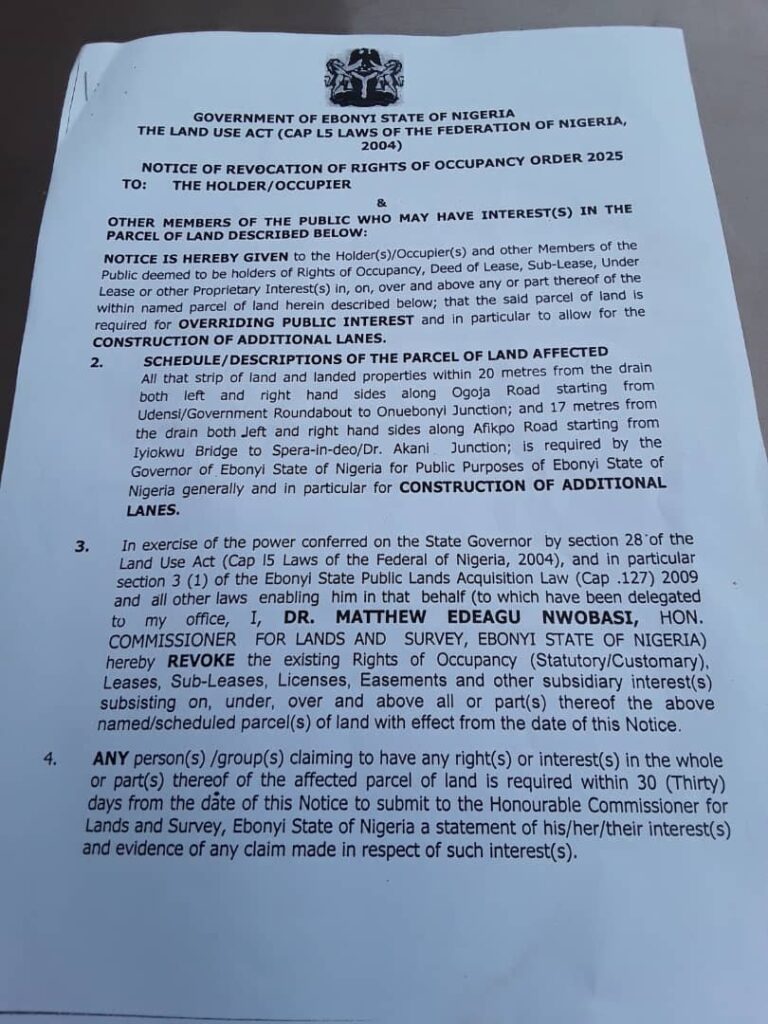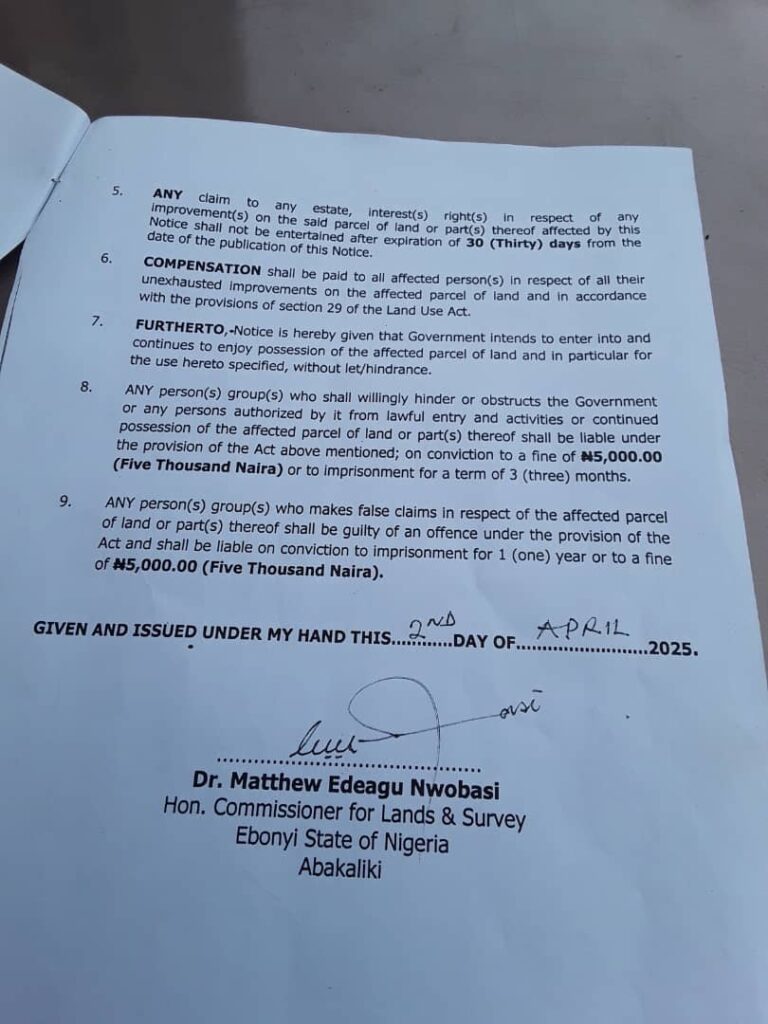Is Ebonyi Governor Settling Scores As Citizens Lament Government Policy Summersault And Priority Misplacements
When the righteous is on the throne, goes a popular clichè, the people rejoice.
Ironically, in Ebonyi State, the reverse is the case as people lament, wail and groan over what they describe as agonizing and painful government policies aimed at victimization, intimidation and destruction of people’s properties.
Incidentally the nonindigenes of the state are the worst hit as it does appear that the government policy is deliberately targeted at dispossessing them their investments in the state.
Abakaliki, the state capital of Ebonyi is said to belong to a the Izzi clan, one of the greater Abakaliki people of the state. This is the same clan where the present governor, Francis Nwifuru comes from.
In addition, Abakaliki before becoming the state capital was regarded as the zoning headquarters of what is known as the Abakaliki bloc of Ebonyi State. This bloc comprises the Ikwo, the Ezza and the Izzi clans.
Before the creation of Ebonyi State in 1996, property investments and ownership in Abakaliki were hugely dominated by the non indigenes who are not from Abakaliki bloc. These non indigenes are people from Anambra, Imo, Abia etc. The non indigenes also included Ebonyians from Afikpo zone, the other bloc that were joined to form Ebonyi State after creation. The properties were legally acquired from the indigenes by those regarded today as non indigenes.
This non indigenes were hugely accommodated by the two previous administrations of Dr. Sam Egwu and Martin Elechi. Though Egwu and Elechi belong to the communities of Ngbo and Ikwo that make up the Abakaliki bloc, they were very receptive to the non indigenes who are not from the Abakaliki bloc. Egwu even brought some Anambra and Imo indigenes into his cabinet.
Francis Nwifuru, the present governor of Ebonyi State is the first person from Izzi, the clan said to be the owners of Abakaliki, now the state capital, to be elected the governor of Ebonyi state.
Incidentally, since the advent of his administration the investments of non indigenes have been subjected to booths of threats of acquisitions, destruction, seizure and demolition under the guise of overriding public interest.
Before Nwifuru government started mouthing this overriding interest slogan of confiscation of people’s properties, there are reported cases of indigenes of the governor’s clans, Izzi going about threatening to revoke occupancy certificates of nonindigenes living in Abakaliki.
One Barrister Nunu who parades himself as the official lawyer of Izzi land moves around with thugs threatening people with eviction claiming that the lands which were sold to them by their forefathers were under lease.
They would threaten the land owners to either renew their lease or face eviction by the community.
Sadly enough, these unwholesome activities have been going on under the very watch of the present governor of the state who is from Izzi, same community with Nunu.
It’s therefore not out of place for people to quickly equate recent government policies of acquisitions of people’s properties as official stamp in agreements with the ethnic cleansing agenda of Izzi people which was being championed by Barrister Nunu without any cautions from government.
It’s believed in many quarters that the action now being implemented by the state government is to fully maximize the opportunity of whittling down the economic influence of non indigenes in the state now that they are at the helm of affairs.
Before the creation of Ebonyi State, almost every notable structure in Abakaliki is owned by non indigenes of the State. Properties in the three major commercial axis of the state, Water works, Ogoja and Afikpo roads respectively are all owned by non indigenes.

The indigenous people of Abakaliki axis started venturing into property business just after the creation of Ebonyi state.
Apparently, the state creation afforded them opportunities into public funds. But before then the major commercial hubs of the city have already been acquired and built up by the non indigenes.
It is therefore not surprising that the recent revocation, acquisitions and demolition of properties within the Vanco, a major commercial centre of the capital city are exercise targeted at non indigenous properties only. Few if there’s any indigenous properties along this axis are just in minority.
The Mayor Electronic stores, a five storey edifice, levelled to the ground is owned by Anambra man. Enyi fueling station, built before the creation of Ebonyi State belongs to none indigene. Same with friendship supermarket and a whole lot of massive structures in that axis.
As a fulfilment of the plan to whittle down the economic influence of non indigenes in the state, Nwifuru government recently has issued another notices of acquisition and demolitions of properties stretching along Ogoja road to Onuebonyi. Same notices are said to have been issued to property owners along Afikpo road, starting from same Vanco roundabout to Sperado junction.
These again are major commercial hubs of the town already dominated and built up by non indigenous people of Abakaliki bloc.
A notice issued on April 2, 2025 by Dr. Matthew Edeagu Nwobasi, commissioner for lands and Survey, quoting the land use Act (15 law of the federation 2024), said “the strips of land 20 metres both left and right along Ogoja and Afikpo road have been revoked for public interest.”
The people accuse the government of misplacement of priorities in a state that is backward in critical aspects of human development.
Ebonyi they claim exhibits deficit in both human capital and infrastructural development.
The government they say rather than focus on reducing the poverty level of the people have instead embarked on policies that only add sorrow and pains, subjecting the citizens to lives of regrets and lamentation.
Ebonyi, they say lacks adequate health facilities in the rural areas. Ebonyi lacks adequate water supply both in the cities and rural areas. Abakaliki the state capital does not have a functional pipe borne water.
The state is often ravaged by Guinea worms due to lack of decent water supply. Roads in the rural communities of the state are in very deplorable conditions. Hundred percent of the rural areas in the state have no electricity supplies. Most primary and secondary schools in the state are in deplorable conditions and in shambles. There’s no functional industry in Ebonyi State.
The government they say have continued to embark on what they describe as white elephant projects which they say have no existential impact on their lives, accusing the government of only interested in enriching the pockets of government officials by the gigantic and lack of people oriented policies.
Ebonyi, they say is mostly populated by tricycles and motorcycles than cars and heavy duty vehicles. What gives the state a semblance of a busy town is the investment of private individuals majorly on property development.
Recent demolitions of such private property investments in the state, the people regret, is actually a red sign that such investments are not welcomed in the state.



